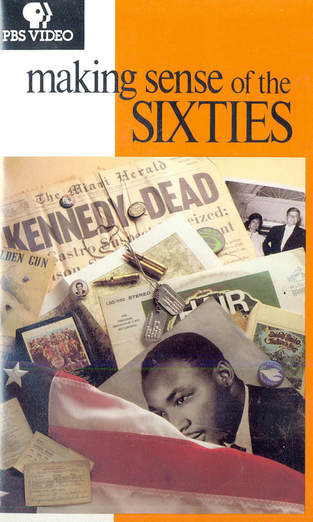 Making Sense of the Sixties is a six-part documentary series that takes a look back at one of the most turbulent decades in recent American history. The series examines both political and cultural changes as well as the escalating war in Vietnam that shaped the era and left an indelible mark on later decades. The series was shown on PBS from January 21-23, 1991, just as many of the baby boomers were entering their fourth decade of life. Produced by Ricki Green and David Hoffman, and narrated by Carol Rissman, the series provides a thorough overview of the decade and does a decent job of describing the roots of the decade’s upheaval. Among those interviewed are former hippies, social activists, musicians, students, commune members, authors, and parents. Through their musings and ruminations, these now middle-aged men and women reveal a great deal of uniformity—not in politics or philosophy, but in their deeply felt emotions about the period. The program garnered mixed reactions at the time, with some critics like Ken Tucker of Entertainment Weekly calling it “a little sloppy.” Walter Goodman of The New York Times highlighted some of the series’ flaws in his review but ultimately acknowledged that it “makes an effort to reassess the impulses and consequences of a heady period.” Though the chaotic Sixties didn’t achieve the Utopia many of its participants had wanted, the era did change the country, and it ultimately left some things forever behind. The entire series can be found on YouTube courtesy of producer David Hoffman. Episodes: Seeds of the Sixties The first episode traces the origins of the revolution back to the 1950s, when conformity and stereotypes profoundly influenced baby boomers, who questioned an older generation’s values and broke down social parameters of the era. We Can Change the World The second episode tackles the idealism and activism of young students on college campuses and in the civil rights movement. It covers efforts to register black voters in the South, the impact of JFK, the Cuban Missile Crisis, and President Johnson’s “unconditional war on poverty.” Breaking Boundaries, Testing Limits The third episode examines the profound social changes that emerged during the counterculture revolution. It includes the rebellion in sexual behavior and drug use, the 1967 Haight-Ashbury Summer of Love, commune life, and the rock concerts at Altamont and Woodstock. In a Dark Time The fourth episode recalls the protests against the Vietnam War and urban riots over the civil rights movement. It examines the killings of Dr. Martin Luther King Jr. and Robert Kennedy, as well as the 1968 Democratic National Convention. Picking Up the Pieces From the Kent State and Jackson State killings to the rise of extremist groups like the Black Panthers, the fifth episode examines the confrontational politics that emerged toward the end of the decade. It also covers the first Earth Day and offers some of the recollections of Vietnam veterans. Legacies of the Sixties In the sixth and final episode, some of the series’ interviewees assess the decade’s impact on America, and the attitudes and ambitions that shaped their own lives.
0 Comments
|
AuthorMohammad Osman is an Artist, Writer, & Cultural Historian. ArchivesCategories |
- Home
-
Articles
-
Film
>
- Dark Side of the Screen: The Art of Film Noir
- Gothic Romance: The Art of the Macabre
- Perchance to Dream: The Art of Dark Deco
- The Road Goes Ever On: The Art of Middle-Earth
- There and Back Again: The Visual Poetry of Middle-earth
- King Kong: The Eighth Wonder of the World
- It's Alive: Universal Classic Monsters
- It Came from Beyond: Invasion of the Sci-Fi Films
- Creatures of Habit: Teenage Mutant Ninja Turtles
- Myth and Magic: The Art of Comic Book Films
- Arabian Nights: Sinbad's Adventures
- Music >
- Games >
- History >
-
Film
>
- Artwork
- Community
- About
- Contact

 RSS Feed
RSS Feed